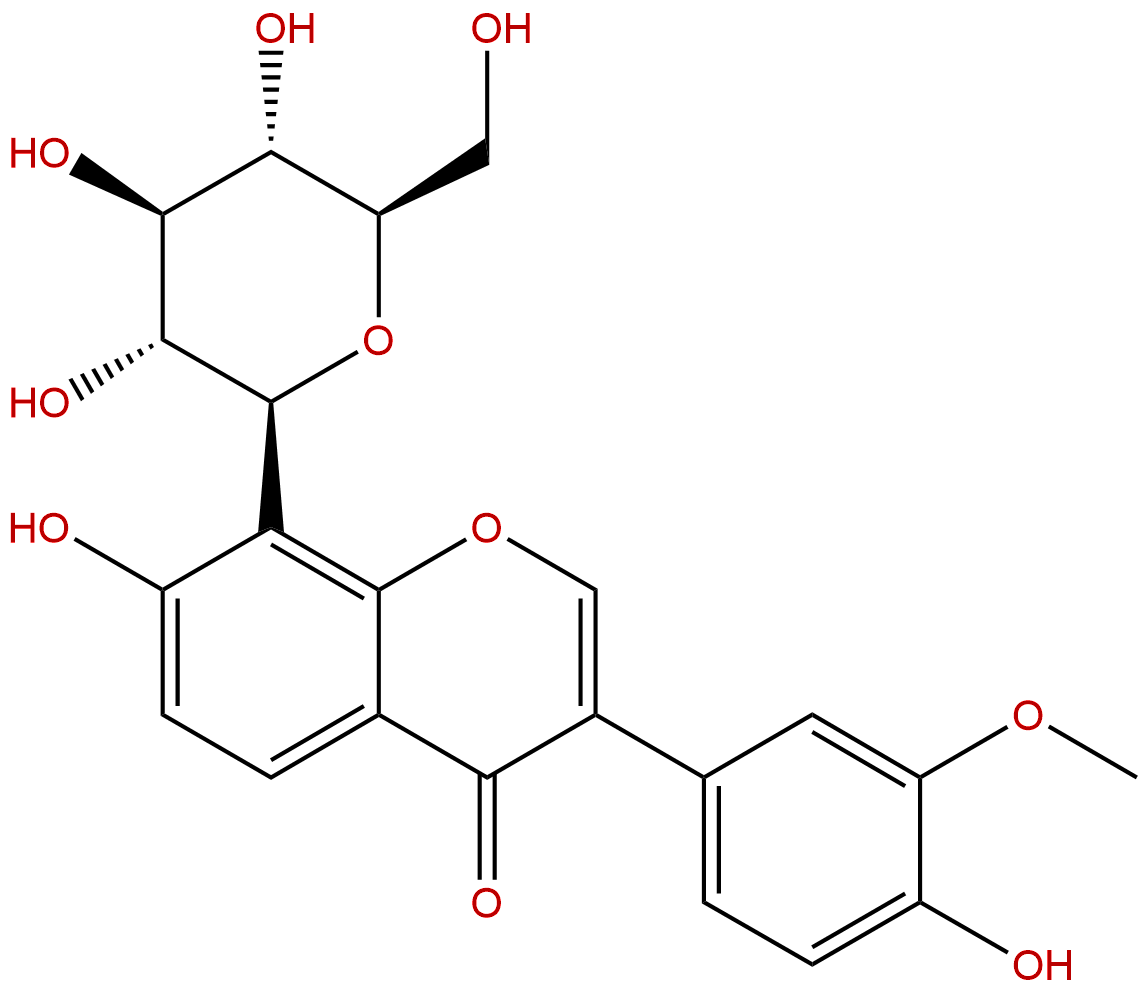
3'-MethoxyPuerarinCAS No.:117047-07-1
|
||||||||||
 |
|
|
||||||||

| Catalogue No.: | BP0067 |
| Formula: | C22H22O10 |
| Mol Weight: | 446.408 |
Synonym name: Puerariaglycoside 3
Catalogue No.: BP0067
Cas No.: 117047-07-1
Formula: C22H22O10
Mol Weight: 446.408
Botanical Source: Pueraria lobata
Purity: 95%~99%
Analysis Method: HPLC-DAD or/and HPLC-ELSD
Identification Method: Mass, NMR
Packing: Brown vial or HDPE plastic bottle
Can be supplied from milligrams to grams.
For Reference Standard and R&D, Not for Human Use Directly.
Inquire for bulk scale.
Description:
3'-Methoxypuerarin shows neuron protection activity, it can protect hippocampal neurons against ischemia/reperfusion injury by inhibiting apoptosis. 3'-Methoxypuerarin has antioxidant activities, it shows ONOO(-) scavenging activity and weak NO· and O(2)(-) scavenging activities.
References:
Arch. Pharm. Res., 2012, 35(5):823-37.
Anti-inflammatory and antioxidant activities of constituents isolated from Pueraria lobata roots.
In order to evaluate the anti-inflammatory and antioxidant activities of Pueraria lobata roots and its active components, in vitro inhibitory activities against lipopolysaccharide (LPS)-induced nitric oxide (NO) production, inducible nitric oxide synthase (iNOS), cyclooxygenase-2 (COX-2) protein expression, and tert-butylhydroperoxide (t-BHP)-induced reactive oxygen species (ROS) generation in RAW 264.7 cells, as well as in vitro scavenging activities against 1,1-diphenyl-2-picrylhydrazyl (DPPH), peroxynitrite (ONOO(-)), nitric oxide (NO·), superoxide anion (·O(2)(-)) and total ROS, and inhibitory activities against ONOO(-)-mediated tyrosine nitration, were determined.
METHODS AND RESULTS:
Repeated column chromatography was performed to isolate four known compounds from the anti-inflammatory and antioxidant EtOAc fraction: daidzein; genistein; puerarin; (+)-puerarol B-2-O-glucopyranoside; four known compounds from the anti-inflammatory n-hexane fraction: lupenone; lupeol; puerarol; coumestrol; seven known compounds from the antioxidant n-BuOH fraction: allantoin; 3'-hydroxypuerarin; daidzein 8-C-apiosyl-(1→6)-glucoside; puerarin; genistin; 3'-Methoxypuerarin; daidzin. Among these compounds, lupenone and lupeol reduced NO production, as well as iNOS and COX-2 protein levels in LPS-stimulated RAW 264.7 cells. Furthermore, lupeol showed significant inhibitory activity against intracellular ROS generation by t-BHP. Meanwhile, 3'-hydroxypuerarin showed marked ONOO(-), NO·, total ROS scavenging activities, and weak ·O(2)(-) scavenging activity, while 3'-Methoxypuerarin showed ONOO(-) scavenging activity and weak NO· and O(2)(-) scavenging activities, suggesting that existence of the 3'-hydroxyl group in puerarin plays an important role in the scavenging of ONOO(-), NO·, and total ROS, as well as inhibiting the ONOO(-)-mediated tyrosine nitration mechanism.
CONCLUSIONS:
These results indicate that P. lobata roots and its constituents may be a useful therapeutic and preventive approach to various inflammatory diseases and oxidative stress-related disease.
Chinese Journal of Physiology, 2010, 53(2):136-40.
Protection by 3'-methoxypuerarin of rat hippocampal neurons against ischemia/reperfusion injury.
3'-Methoxypuerarin (3'-MOP) is an isoflavone extracted from radix puerariae. The aim of this study was to investigate the role and the mechanism of 3'-MOP in the protection of hippocampal neurons against cerebral ischemia/reperfusion (I/R) injury in rats.
METHODS AND RESULTS:
I/R injury was induced by a modified four-vessel occlusion model. Rats were randomly divided into an I/R group, an I/R + 3'-MOP group and a control group. Histological changes in the neurons of the hippocampal CA1 region were observed with hematoxylin and eosine (H&E) staining. The apoptotic neurons in the hippocampal CA1 area were counted with the terminal deoxynucleotidyl transferase-mediated dUTP nick-end labeling (TUNEL) staining.
CONCLUSIONS:
The results showed that compared with the I/R group, 3'-MOP increased the number of surviving neurons in the hippocampal CA1 region (P < 0.001) and markedly reduced the number of apoptotic pyramidal neurons (P < 0.001) after I/R injury. In conclusion, 3'-MOP can protect hippocampal neurons against I/R injury by inhibiting apoptosis.
HPLC of 3'-MethoxyPuerarin
